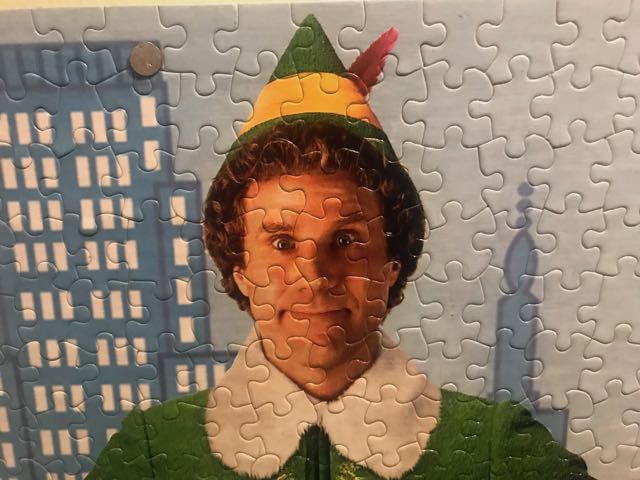Enjoy the Great Milwaukee Winter with ice skating at the Christmas Carnival of Lights. Whether you’re a veteran on the ice or lacing up for the first time, ice skating under the twinkling lights is a winter delight sure to make your spirits bright!
Now open through February 1!
This article was originally published in 2021.
In the past few years, my family and I have rediscovered puzzles. As a person who doesn’t spend time in cabins, I never really thought about doing a puzzle until a few years ago, when on a whim I bought this 1,000-piecer of Buddy from "Elf" as a holiday gift for my kids. (The best part was when we were done, like Buddy, we got to say "You did it!" over and over again.)

Since then, we’ve semi-committed in a non-committal way to piecing together an annual puzzle, around the holidays. This year, we did one of the artist and visionary Frida Kahlo and it was our most challenging puzzle to date. Needless to say, Frida was a hairy gal, and when you throw in a cat and monkey with very similar black hair, you find yourself with 100+ pieces that literally look exactly the same.
But we prevailed and put the last piece in place late Sunday night.
I had to brag on social media about our puzzle progress, of course, and it generated a great thread. Friends I’ve known for years revealed themselves as hardcore puzzlers. We debated "to glue or not to glue" once finished (pro-glue here!) and one friend convinced me to get over my unwillingness to buy puzzles from thrift stores because I feared missing pieces.
"I've had really good luck with all pieces from the thrift shop," she wrote in the Facebook thread. "It’s almost a check on humanity to see if someone would donate a puzzle without all the pieces. Actually, they often have all the edge pieces in a separate baggie. I think puzzlers are a special breed of people."
Here are 6 reasons puzzlers are gonna puzzle:
1. Personal satisfaction
The amount of satisfaction felt from searching for a piece and finally getting the fit – that perfect snap – is oddly satisfying. And afore-mentioned satisfaction spikes when the puzzle is completed. It’s like every project you never completed is temporarily absolved. (That baby never would have worn that crocheted sweater anyway!) There’s an actual feeling of real-and-rare personal satisfaction. A true sense of achievement.
2. Not-too-instant instant gratification
Finishing a puzzle takes time. Some people, like my friend Emily, are professionals and can complete a 1,000 piece puzzle in a single sitting. But for many, doing a puzzle is a long-term project, one that takes many hours to complete. The experience is made of snippets of short-term gratification – getting the right pieces to fit – and the long-term glee of completion or, as I like to say, "when all of the pieces finally fall into place."
3. Puzzles are Prozac
It’s possible that the neurotransmitter, dopamine, is produced when doing puzzles. Dopamine helps us concentrate, feel optimism, have confidence and increase memory. Look out, Big Pharma, the puzzles are coming for ya.
4. They keep us "in the moment"
People wiser than I have shared with me – through myriad books and podcasts – how to "be in the moment," but for me, futzing over puzzles naturally hit the pause button on my brain for all thoughts other than "do these two pieces fit or don’t they?" and "I need a green corner piece. I’m searching for a green corner piece."
5. Finally, a healthy addiction
One friend, who recently bought a puzzle for the first time in her adult life, compared her "puzzle self" to a coke fiend. "I actually lost sleep over it," she said. There are so few things that enrapture us as adults, so if a cheesy picture on paperboard cut into a bazillion pieces can spark that much joy (ahem) consider it a 500-piece blessing. Plus, puzzles are cheap, legal, fun and don’t contain carbs.
6. Night-night, Netflix
I enjoy watching 17 episodes of a show in a row as much as the next guy, but it's a fun change of pace to do something screen-free. During one puzzle sesh we even fired up the record player like it was 1979. Didn't even notice the internet went out.
Puzzle on, people!
To super geek-out on puzzles, watch how they're made:
Molly Snyder started writing and publishing her work at the age 10, when her community newspaper printed her poem, "The Unicorn.” Since then, she's expanded beyond the subject of mythical creatures and written in many different mediums but, nearest and dearest to her heart, thousands of articles for OnMilwaukee.
Molly is a regular contributor to FOX6 News and numerous radio stations as well as the co-host of "Dandelions: A Podcast For Women.” She's received five Milwaukee Press Club Awards, served as the Pfister Narrator and is the Wisconsin State Fair’s Celebrity Cream Puff Eating Champion of 2019.


